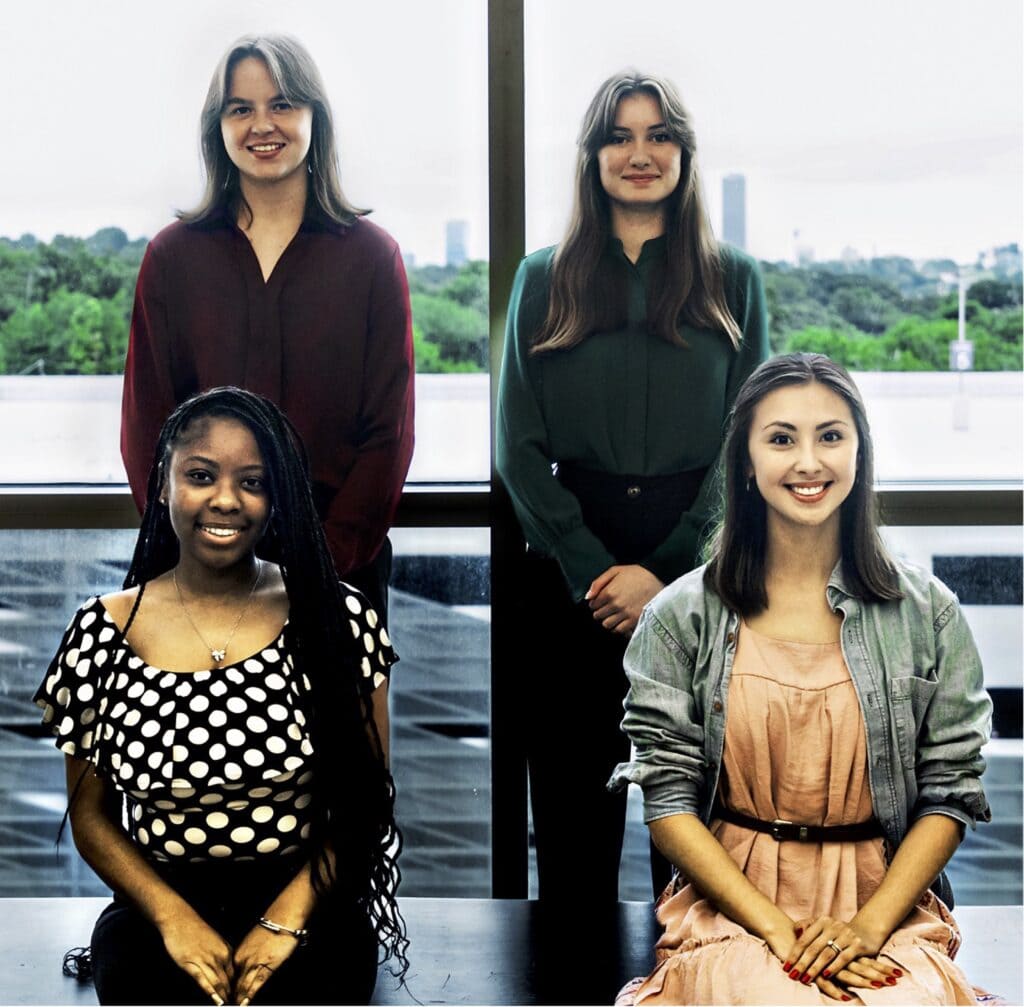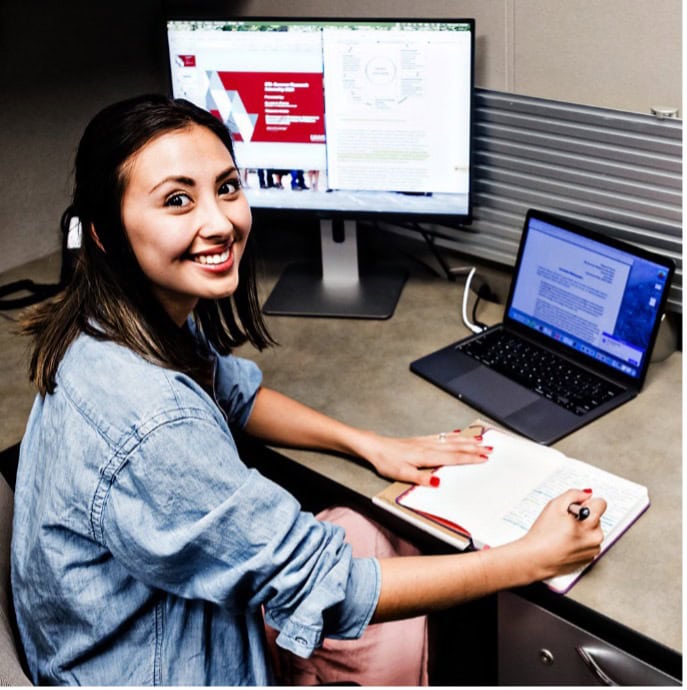
Back left to right: Emma Chappell, Ava Storey; front left to right: Mya Tolbert, Allison Purvis
The UAMS Department of Biomedical Informatics (DBMI) is sponsoring several college and high school students this summer, mentoring them as they developed projects in the field of biomedical informatics. DBMI faculty Tremaine Williams, Ed.D.; Mathias Brochhausen, Ph.D.; David Ussery, Ph.D.; and Fred Prior, Ph.D., are teaching the students the fundamentals conducting well-designed research.
“The students all have such diversity in their interests,” Williams said. “So, what is the common thing that can support everyone’s individual career goal? That’s informatics, because informatics is everywhere. The data we collect and the use of the data that we collect is integral to all of their fields.”
For example, Williams is teaching the interns how to write large dataset expressions to fix missing elements, identify errors and pair mismatched files or variables. This “cleaning” of the datasets ensures the data is ready for analysis.
The students come from a variety of interests. They are:
- Mya Tolbert, a junior at the University of Arkansas at Pine Bluff studying pre-dentistry. Her project uses biomedical informatics to examine risk factors for gum disease, including diabetes and dental insurance. Mya plans to be a dentist. She also spent time with the UAMS Dental Residency this summer. Mentor: Williams.
- Ava Storey, a junior at the Florida Institute of Technology who is from Benton, Ark., and is studying genomics and molecular genetics. This summer, she is researching drug-drug interactions between cardiovascular medications and other medications that could be prescribed for comorbidities as part of the Equitable Standards of Care Delivery in Team-based Risk Stratification of African Americans with Congestive Heart Failure study. Mentor: Williams.
- Allison Purvis, a senior at the University of Arkansas at Fayetteville studying biology on a premed track. She is using big data to predict characteristics of patients with long COVID and has spent time in the neonatal intensive care unit at Arkansas Children’s Hospital. She wants to be a pediatrician and open her own clinic. Mentor: Williams.
- Emma Chappell, a junior at the University of Arkansas at Fayetteville studying international studies and philosophy. She is working on the Trauma Institutional Priorities and Teams for Outcome Efficacy (TIPTOE) study, which is examining data from major trauma centers to identify institutional features that impact patient care. She is interested in medical ethics and other applications of philosophy in the medical field. Mentor: Brochhausen.
- Anu Iyer, a sophomore at the Georgia Institute of Technology (Georgia Tech) in Atlanta studying biology on a premed track. She is continuing her work to use machine learning to detect Parkinson’s Disease. Mentor: Prior.
- Autumn Gault, a student from Hendrix College in Conway. She is working to establish baseline information that could help develop a genetic methodology to more effectively test for rheumatoid arthritis in young, non-presenting patients using Oxford Nanopore flow cells, which can sequence DNA and RNA in real time. She is targeting three Human Leukocyte Antigen system genes known to have DNA methylation patterns associated with rheumatoid arthritis. Mentor: Ussery.
- Aakash Bhattacharyya, a junior at Central High School in Little Rock who would like to pursue medicine. He is working on two different informatics methods to predict microbial protein toxins that could be deadly to the patient: 1) profile hidden Markov models (HMMs) of conserved protein structural domains; and 2) a Large Language Model (LLM) built specifically for bacterial genes that can be further refined to target toxin gene families. Mentor: Ussery.
By summer’s end, some of the students will present their research at the Arkansas Undergraduate Summer Research Symposium. DBMI also strives to help them achieve a national level presentation and a publication with a faculty co-author.
“Many of our former interns go on to study informatics, if not at UAMS DBMI then elsewhere,” Williams said. “I’ve had previous interns go to medical school and dental school. Having that research, national presentation and publication experience makes them so much more competitive. I would say it puts them in the top 10% for the professional programs that they want to get into.”
But the experience is not a one-way street. Williams said a previous intern had an idea that initially struck him as too “outside of the box,” but when they pursued the research and published together, it ended up forming the basis for a successful R21 grant. “They bring in fresh ideas and help you see things from a different perspective,” said Williams, who encourages other faculty to consider hosting interns with their grants, especially if traditional internship funds continue to run short, as they did this year. “You get more out of it than you might realize.”
Have to ‘See It to Be It’: Summer Intern Discusses Benefits of Mentors
Belonging to a group historically underrepresented in biomedical sciences can make you wonder if you “really belong.” For many young people in a rural state like Arkansas, simple geography can prevent you from having any mentors or role models in science.

Allison Purvis, a summer intern in the UAMS Department of Biomedical Informatics (DBMI) using big data to predict characteristics of patients with long COVID, wants to be a pediatrician and open her own clinic someday. Growing up in Prescott, a town of about 3,000 people in Southwest Arkansas between Hope and Arkadelphia, helped her identify a problem common across the state: a lack of access to health care.
“If we wanted to see a doctor or a pediatrician, we had to travel so far to see one, and then maybe even further than that to find one that fits your insurance,” Purvis said.
But wanting to solve that problem is one thing. Feeling equipped to do so has proved challenging. She hopes her time as a summer intern in biomedical informatics will help.
“I don’t have any connections with doctors – nobody,” Purvis said. “So one of the big things I hope to get out of this program is to make connections and to just understand what it’s really like. So far, I have learned a lot about data and the scientific process, but also, being in this environment has made it seem more accessible to me to actually be able to go to med school and be a doctor. That’s huge for me.”
Purvis’ mentor, Tremaine Williams, Ed.D., understands and said it is an important part of why he continues to mentor students.
“Each of us had people who were ‘waymakers’ for us and helped us find our path,” he said. “I’ll continue to support students like these, and I hope others will too.”
